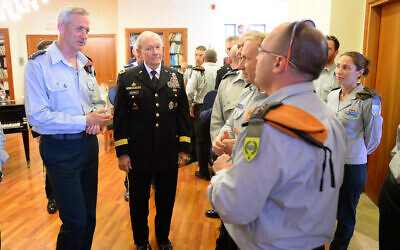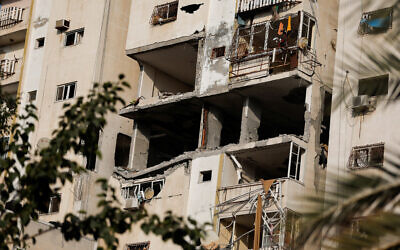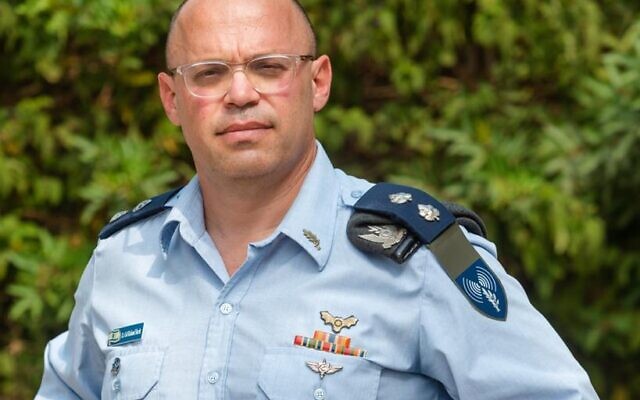Explaining the IDF’s moves to the world’s media – in a strong Scottish accent
Lt-Colonel Richard Hecht took up his role as the Israeli military's new international media spokesman just 24 hours before Operation Breaking Dawn against Islamic Jihad
Jenni Frazer is a freelance journalist
A couple of years ago, when Britain’s former Air Chief Marshal Sir Stephen Hillier, who is from Kilmarnock, first heard Richard Hecht speak, it is fair to say that his jaw dropped open. His deputy, Sir Stuart Atha, from Ayrshire, was similarly astonished.
For Hecht was then head of the Israeli air force’s international policy relations — and despite many years living in Israel, his speech is pure, unadulterated Glaswegian English.
This month Hecht, now a Lt-Colonel, took over in one of the hottest seats in Israel as the IDF’s international spokesman, the man tasked with the challenge of explaining the actions of the military to foreign reporters in print, TV and online. And Hecht — who has both vast operational experience as a battalion commander, as well as a self-imposed mission to “bridge both cultures” — couldn’t have started his new job at a stickier time, only the day before Operation Breaking Dawn, Israel’s most recent conflict with Islamic Jihad in Gaza.
Hecht’s presentation to the two British RAF officers was, for him, a form of closure. “It was a secret obsession with me: my grandfather had served in the RAF and talked to me about being a Jew in the RAF, and that it had been complicated. So to some extent it was closing a circle; I said to my guys, let’s not do training just with the Greek air force, let’s try and work with the British RAF”. The British officers came to Israel and Hecht acted as master of ceremonies. He takes great pleasure, today, in remembering Hillier and Atha’s expressions as he began to speak. “They were looking around for Candid Camera!”

He told his commander at the time: “You will never understand what it means to me, a diaspora Jew, to see you walking into the RAF Officers’ Club.” During Hecht’s tenure with the Israeli Air Force, Israeli pilots took part in joint exercises with the RAF and also took part in celebrating the RAF’s centennial. “It was a massive deal”, Hecht says, almost purring with satisfaction.
It is certainly a long journey from the heavily Jewish suburb of Glasgow’s Newton Mearns, where Richard Hecht and most of his siblings began life (their youngest sister is the only sabra, born after the family made aliya in 1983). Hecht and his identical twin brother are the eldest of the tribe. “Our parents wanted to make a new start, I think they were tired of the diaspora. But it was traumatic: we left a very comfortable lifestyle to live in spartan Israel in the 80s”.
The family went first to an absorption centre in Netanya and then to a kibbutz on the Golan, where socialist principles still ruled and Hecht and his twin were obliged to sleep in the children’s house, away from their parents. It was tough, he says, “but it made us Israelis”.
After Kibbutz El-Rom was privatised, Hecht says, his parents left and went to live in Zichron Ya’akov, a small township in Israel’s north. His mother, Valerie, worked for many years in the Golan Heights and Carmel wineries, while his father Albert turned to agricultural writing. Both his parents are now retired.
Hecht joined the army at 18 and by 22, having met Zohara, now his wife, he had left the kibbutz.
He started his army trajectory serving in a combat unit in the West Bank and the Lebanese border. Gradually he worked his way up to becoming a battalion commander and was then offered the opportunity of studying at the IDF’s expense. As well as being sent to America for a year for the US company commanders’ course, Hecht studied law and political science at Reichman University in Herzlia and spent considerable time working with the American military on a variety of projects, including ballistic missile defence.
He recognises that it was smart of his superior officers to make use of his language skills as well as his operational skills, but says he is conscious of wanting to improve his English in order to make his media presentations pithy and user-friendly. He spent the latter part of his military career moving between foreign relations posts and combat positions.
But Hecht was looking to leave the army and do something else. In March 2020, he was offered a post at New York’s Jewish Heritage Museum, indulging his passion for history and explaining Israel. But on the eve of moving, Covid struck, and the job did not happen.
Instead he went into industry, working in business development for an Israeli defence company. But, with a smile, he admits he “got a bit bored”. A phone call from the army spokesman’s office inviting him back came just in time.
So it was back into uniform and a world he knows inside out, running a team of young men and women, many of them “lone soldiers” who have made aliya without their families. He is relishing the challenge, though he understands there is a “vastly different dynamic” between briefing officers and talking to the international press, many of whom are no respecters of persons.
Not every reporter was ready to accept Hecht’s painstaking assembling of data, showing that it was the shortfall of Islamic Jihad weapons which was killing Gaza’s children, rather than Israeli rockets. For most, he says, that message did make sense.

Less successful has been the media response to the most recent Israeli raids on Palestinian NGOs; Israel says they are fronts for terror organisations, but the CIA says its intelligence does not corroborate this claim. There is a clear feeling that Hecht is content to speak about this story, only insofar as a certain relief that there were no deaths or casualties in the operation.
Home for Hecht now is north Tel Aviv, where wife Zohara is a financial planner and the elder of his two daughters is about to go into the army. (The younger daughter is 15). What does the Glaswegian Israeli Lt-Colonel tell the new recruit? “It will be a fantastic opportunity for her to meet and see Israel. She’s been living in a protected neighbourhood. She’ll meet people of all colours, all races, and she’ll have a chance to promote herself based on her capabilities.” Hecht’s relationship with the diaspora, he says, “remains complicated” — but he’s enjoying the balancing act.

Thank you for helping to make Jewish News the leading source of news and opinion for the UK Jewish community. Today we're asking for your invaluable help to continue putting our community first in everything we do.
For as little as £5 a month you can help sustain the vital work we do in celebrating and standing up for Jewish life in Britain.
Jewish News holds our community together and keeps us connected. Like a synagogue, it’s where people turn to feel part of something bigger. It also proudly shows the rest of Britain the vibrancy and rich culture of modern Jewish life.
You can make a quick and easy one-off or monthly contribution of £5, £10, £20 or any other sum you’re comfortable with.
100% of your donation will help us continue celebrating our community, in all its dynamic diversity...
Engaging
Being a community platform means so much more than producing a newspaper and website. One of our proudest roles is media partnering with our invaluable charities to amplify the outstanding work they do to help us all.
Celebrating
There’s no shortage of oys in the world but Jewish News takes every opportunity to celebrate the joys too, through projects like Night of Heroes, 40 Under 40 and other compelling countdowns that make the community kvell with pride.
Pioneering
In the first collaboration between media outlets from different faiths, Jewish News worked with British Muslim TV and Church Times to produce a list of young activists leading the way on interfaith understanding.
Campaigning
Royal Mail issued a stamp honouring Holocaust hero Sir Nicholas Winton after a Jewish News campaign attracted more than 100,000 backers. Jewish Newsalso produces special editions of the paper highlighting pressing issues including mental health and Holocaust remembrance.
Easy access
In an age when news is readily accessible, Jewish News provides high-quality content free online and offline, removing any financial barriers to connecting people.
Voice of our community to wider society
The Jewish News team regularly appears on TV, radio and on the pages of the national press to comment on stories about the Jewish community. Easy access to the paper on the streets of London also means Jewish News provides an invaluable window into the community for the country at large.
We hope you agree all this is worth preserving.






















